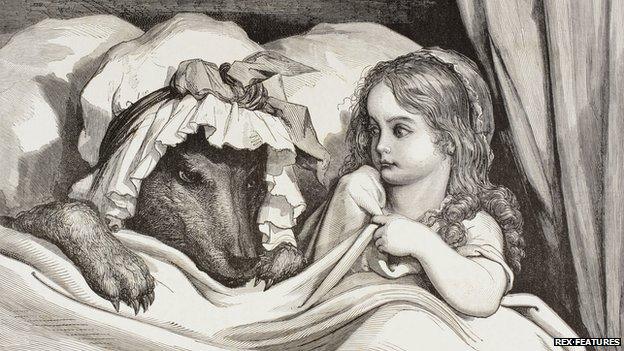Dawkins debate: Should children listen to fairytales?
- Published

Renowned atheist Richard Dawkins has sparked a debate over the appropriateness of telling fairytales to impressionable children. But could these stories actually help with children's rationality, asks Esther Webber.
"There is a very interesting reason why a prince could not turn into a frog. It is statistically too improbable," Dawkins reportedly said during a talk at the Cheltenham Science festival. He has since protested at the way his comments have been portrayed in the media.
Speaking to the BBC, he said that the telling of fairytales had pros and cons. "On the one hand you might expect it would inculcate supernaturalism as real." But at the same time it might have a "beneficial effect" as the child learns there are stories which are not true and which one grows out of.
"A degree of magical content supports imaginative development," says Prof Yvonne Kelly of University College London, "and the transmission of the story is important as it creates intimacy, routine and a bonding experience.
"Children who listen to stories show better results in measures such as literacy tests and SATs - but also in terms of social and emotional development."
Dr David Kirby, a researcher on science and public life from Manchester University, points out that Dawkins himself is able to distinguish between fiction and reality, despite being told stories as a child.
"Other children have the same reasoning capacity as the young Richard Dawkins," says Kirby. They can enjoy and be entertained by fiction without experiencing difficulties in differentiating stories from the material world.
Fairy stories help children to read and boost their understanding of the world, adds Dominic Wyse, a professor of early childhood and education at the Institute of Education, whose research is on creativity in the curriculum. Little Red Riding Hood, he says, is "essentially about telling young girls to stay away from strange men".
Sally Goddard Blythe, the author of The Genius of Natural Childhood, goes further, arguing there is something particularly helpful about fairytales. "Tropes such as 'once upon a time' or 'in a far-away land' mean that these stories often begin with an introduction that immediately flags up that these are things do not occur in everyday life and help a child to inquire into what is real and what's not."
Fantasy and myths can even help children think outside the box and make the sort of leaps that lead to scientific invention and discoveries. "It would be a very sanitised, clinical world in which we only taught children about statistically likely scenarios," she concludes.
Follow @BBCNewsMagazine, external on Twitter and on Facebook, external